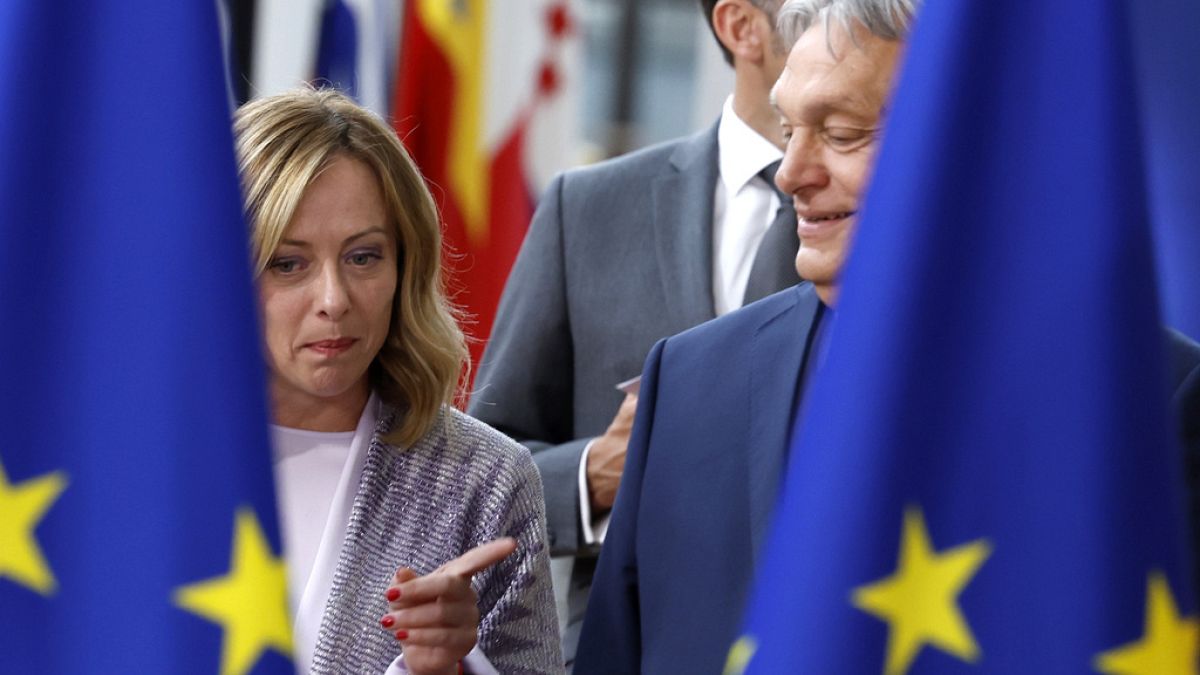


The Conservative duo slammed the nomination process to elect EU high-level positions as undemocratic and misaligned with the outcome of the EU elections, which saw the right wing gaining prominence in the European Parliament.
Hungarian and Italian Prime Ministers Viktor Orbán and Giorgia Meloni accused the EU of being undemocratic after the pair were excluded from preliminary negotiations and failed to secure a high-level seat in the next political cycle for their political groups.
After several hours of negotiations, European Commission President Ursula von der Leyen, who hails from the centrist European People’s Party (EPP) was nominated president of the Commission, former Socialist Portuguese Prime Minister António Costa as president of the European Council, and Liberal Estonian Prime Minister Kaja Kallas as the High Representative for Foreign Affairs and Security Policy.
Meloni voted against Costa and Kallas, and abstained on Ursula von der Leyen, several diplomats told Euronews, while Orbán voted against von der Leyen, abstained on Kallas and backed Costa.
The Italian Prime Minister said the proposal for top jobs formulated by the European People’s Party (EPP), socialists (S&D) and liberals (Renew Europe) was “wrong in method and substance”, and did not reflect the outcome of the EU elections held on 6-9 June, which saw the European Conservatives and Reformists group – to which Meloni’s Brothers of Italy party belongs – effectively became the third force in the European Parliament, after the EPP and the S&D.
“I decided not to support it [top jobs] out of respect for the citizens and the indications that came from those citizens during the elections. We continue to work to finally give Italy the weight it deserves in Europe,” the Italian Premier wrote on X.
Her Hungarian homologue Orbán echoed similar concerns saying “European voters have been deceived” slamming the new high-level positions as going against the will of the electorate, which shifted to the right, to the detriment of the greens and the liberals in Parliament.
“The EPP formed a coalition of lies with the left and the liberals. We do not support this [top jobs] shameful agreement,” said Orbán.
Ultimately Hungary and Italy’s position will have no impact on the nominations, though von der Leyen may still seek to garner support from Meloni’s 24 Brother of Italy MEPs for her parliamentary confirmation vote in July. Von der Leyen needs to be confirmed by a majority of the Parliament’s 720 MEPs.
Orbán’s position, though unexpected, sets the tone for the start of his country’s assumption of the revolving presidency of the EU Council as the country takes over the position from Monday (1 July) for six months.
German Green MEPs Daniel Freund and Damian Boeselager (Germany/Greens) penned a letter to European Council President Charles Michel on Thursday (June 27) calling on the institution’s powers to block the upcoming EU Hungarian Presidency arguing “it’s time to stand up against Viktor Orbáns’ bullying”.
Undersigned by 20,000 citizens, the letter claims it to be “extremely harmful” for the EU’s reputation to be represented by Hungary, a country with “high levels of corruption” and with a track record for disrespecting the rule of law.
“On the European level, the Orbán government has compared the EU with a dictatorship,” the letter ran.